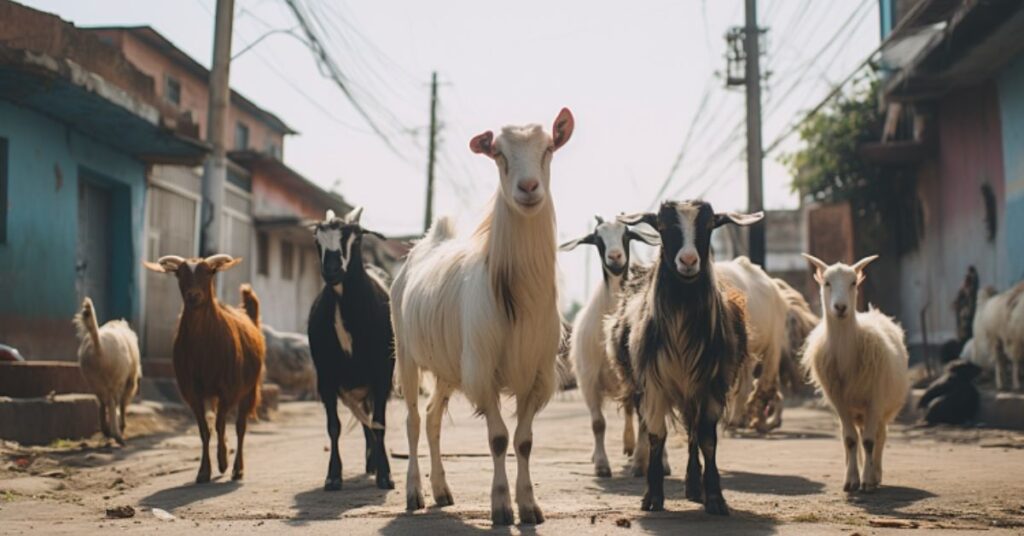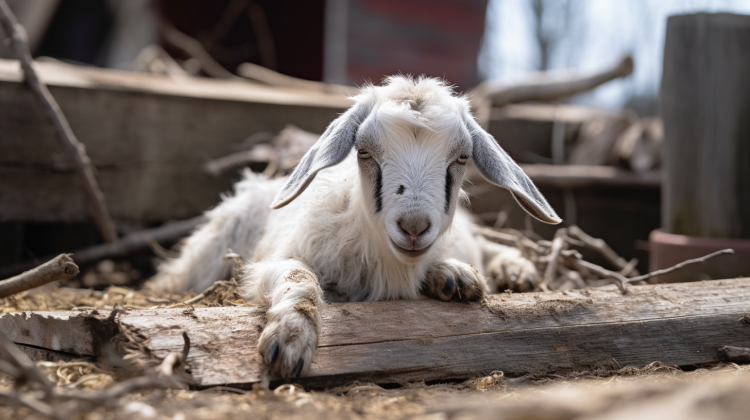Pickles are a popular snack for humans, but what about goats? As a veterinarian with over 10 years of experience working with goats, I’m often asked if these curious creatures can eat dill pickles, gherkins, and other brined or pickled foods. In this comprehensive guide, I’ll share everything you need to know about feeding pickles to goats.
In short, yes – goats can safely eat pickles in moderation. However, there are some important factors to consider before tossing your leftover sandwich pickles into the goat pen. Read on to learn about the nutritional profile of pickles, the benefits and risks of feeding them to goats, how much to offer, and more expert tips from my decade-long career as a goat veterinarian and farmer.
A Look at the Nutritional Value of Pickles
To understand if pickles are a healthy treat for goats, let’s first examine what pickles are and the nutrients they provide.
What are Pickles?
Pickles are cucumbers that have been preserved in an acidic liquid like vinegar or brine. This process utilizes fermentation, acidity, and salinity to extend the shelf-life of cucumbers beyond their fresh state.
There are many types of pickled cucumbers, including:
- Dill pickles – cucumbers pickled with dill seasoning
- Bread and Butter pickles – sweetened cucumbers pickled with spices
- Gherkins – small cucumbers traditionally pickled in vinegar
- Kosher dills – cured in brine with garlic and dill
The pickling process draws moisture out of cucumbers while allowing them to absorb the surrounding liquid. This alters their nutritional composition compared to fresh cucumbers.
Nutrients in Pickles
Pickles are low in calories and fat. They also provide:
- Electrolytes – sodium, potassium
- Vitamin K
- Vitamin C
- Antioxidants
- Probiotics from fermented pickles
However, the high sodium content from brining makes pickles a high-salt food. The vinegar used for pickling also gives them a very sharp, acidic taste.
Now that we know the basics of pickle nutrition, let’s explore how this applies to goats.
Are Pickles Good or Bad For Goats?

Feeding pickles to goats comes with both benefits and risks to weigh. Here are the main pros and cons:
Potential Benefits of Feeding Pickles to Goats
- Electrolytes – The sodium and potassium in pickles can help replenish electrolytes lost through dehydration, illness, or heat stress. This makes them helpful during times of exertion or temperature extremes.
- Vitamin C – Goats cannot make their own vitamin C like humans can. The vitamin C in fermented pickles can support immune function.
- Probiotics – Fermented pickles contain beneficial bacteria that support digestive health. This makes pickles a potential probiotic source.
- Flavorful treat – Goats love exploring new flavors. The tart, tangy taste of pickles is a nice change from hay and grass.
Potential Risks of Feeding Pickles to Goats
- High sodium – Excess salt can lead to hypertension, kidney strain, and toxicity. Goats are especially sensitive.
- Acidity – The acidic vinegar brine can disrupt rumen pH and cause GI upset if goats eat too many pickles.
- Sugar content – Pickles with added sugar can lead to overfeeding and obesity.
- Food-borne illness – Improperly fermented pickles can harbor botulism spores and other pathogens. Only feed goat-safe pickles.
- Choking hazard – Goats may swallow large pieces of pickle whole, risking choking or bloat.
As you can see, moderation and supervision are key when treating goats to pickles. Only offer pickle amounts that align with a goat’s nutritional needs.
How Much Pickle Can Goats Eat?
When feeding pickles to goats, it’s important to limit portions to reduce risks. Here are some pickle-serving guidelines to follow:
- Start with just 1-2 pickle slices per day as you monitor effects
- Limit pickle treats to 2-3 times per week at most
- Never exceed 1 oz (about 5-6 slices) even for large goats
- Pickles should represent less than 5% of total daily feed intake
- Always separate goats before feeding pickles to control portions
- Remove any uneaten pickles within 20 minutes
Ideally, look for reduced-sodium pickle options to minimize salt intake. Avoid heavily sugared varieties. Cucumber spears can be sliced into small pieces to reduce choking risk.
Pickles as Training Treats
One of the best uses for pickles with goats is as an occasional training treat. The strong aroma and flavor entice goats to pay attention during short training sessions. I’ve found a single pickle slice lasts through 5-10 training repetitions with each goat before losing its novelty.
Are Pickles Safe for Pregnant or Nursing Goats?
Pregnant and lactating goats have some additional considerations when it comes to pickle safety:
- Pregnancy – Avoid pickles in late pregnancy due to risks of excess salt. Opt for lower sodium varieties earlier on if offering pickles.
- Nursing – Excess salt from pickles can pass through milk, leading to dehydration in kids. Limit nursing does to just an occasional lick or two.
- Milk flavor – Some goats may transfer pickle flavors to milk if they eat them right before milking. Separate pickles from milking time.
Opt for fresh cucumber slices over pickled varieties when feeding pregnant or nursing does. Always provide plenty of clean drinking water too.
How to Choose Safe Pickles for Goats
Not all pickles are created equal when it comes to goat safety and nutrition. Here’s how to select the best pickles to share with your herd:
Low Salt Options
Seek out low or reduced-sodium pickle varieties. Kosher dills or fermented options tend to be lower in salt than heavily brined products.
Avoid Added Sugar
Steer clear of bread and butter or sweetened pickles. The sugar provides unnecessary calories.
Select Probiotic-Rich Fermented Pickles
Choose raw, naturally fermented pickles like kosher dills for probiotic benefits. Avoid all pasteurized pickles.
Check Ingredients
Scan for undesirable ingredients like onions, chives, MSG, artificial colors, and preservatives. Stick to cucumbers, vinegar, water, spices, and salt.
Refrigerate After Opening
Discard any pickles that have been left unrefrigerated to avoid food-borne pathogens. Never feed warm, bulging, or foul-smelling jars.
Buy Small Jars
Purchase small jars and use opened pickles within 1-2 weeks. Don’t leave half-empty jars sitting around for long periods.
Look for USDA Certification
Seeking USDA approval helps ensure safety standards for commercially packed pickles. This guarantees proper acidity and controls botulism risk.
Following these tips will help you safely incorporate pickled treats into your goats’ diets. But remember – pickles should only be an occasional snack, not a dietary staple.
Health Concerns When Overfeeding Pickles

Giving goats too many pickles can negatively impact their health. Here are some of the most common health issues that can arise:
- Rumen acidosis – Excess acid disrupts rumen pH, leading to poor nutrient absorption and diarrhea. This can progress to life-threatening metabolic acidosis.
- GI upset – Goats may experience cramping, vomiting, constipation, or diarrhea from excess pickles. The high acid, salt, and seasoning irritate the digestive tract.
- Dehydration – The salt in pickles drives water from the body. Coupled with pickle acidity reducing water intake, dehydration is a real risk.
- Urinary issues – Too much salt stresses the kidneys as they process extra sodium. This can lead to stones, infections, and kidney damage over time.
- Mineral imbalances – Excess sodium can interfere with absorption of other minerals like calcium, magnesium, and potassium. This causes deficiencies.
- Obesity – Heavily sugared pickles provide empty calories that quickly accumulate as fat, especially in confinement-raised goats.
Monitor your goats closely when first introducing pickles. Reduce or stop feeding them if any concerning symptoms arise.
Are Pickled Vegetables Other Than Cucumbers Safe for Goats?
Beyond cucumbers, other pickled vegetables may also appeal to goats. Here’s a quick safety overview of some common options:
| Vegetable | Goat Safety |
|---|---|
| Pickled beets | Safe in small amounts – limit due to sugar content |
| Pickled asparagus | Safe in moderation |
| Pickled green beans | Safe in small quantities |
| Pickled carrots | Safe as an occasional treat |
| Pickled eggs | Unsafe due to risks from raw egg consumption |
The same pickle-feeding guidelines apply to other vegetables – offer them sparingly and supervise your goats closely to watch for reactions.
Can Goats Eat Pickled Fruits like Watermelon Rind?
Pickled watermelon rinds are another popular pickled product. But are these fruit pickles safe for goats?
The answer is yes – in moderation. Pickled watermelon rinds made from the white portion of the rind are fine for goats as an occasional snack. However, these fruit pickles tend to be very high in sugar. Limit portions to just one or two small rind pieces at a time.
Avoid the red interior portion of watermelon rinds as they may contain higher levels of citrulline that can be toxic to goats in large amounts.
When Should You Avoid Feeding Pickles to Goats?
While pickles are OK for goats in moderation, there are some situations where they should be avoided. Do not offer pickles if your goats:
- Have a history of urinary calculi or bladder stones
- Are pregnant or nursing (opt for lower sodium varieties)
- Have shown signs of gastrointestinal distress from pickles in the past
- Need to restrict sodium intake due to illness or advanced age
- Have calcium deficiencies or other mineral imbalances you are correcting through diet
You should also avoid suddenly introducing large amounts of pickles to unaccustomed goats. Start with small taster portions.
Use your best judgment, and when in doubt, skip the pickles.
Signs of Pickle Overdose or Sensitivity in Goats
Goats will exhibit symptoms if they eat too many pickles or have negative reactions. Be on the lookout for these signs of pickle intolerance:
- Loss of appetite
- Refusing water
- Lethargy, weakness, or collapse
- Dehydration
- Dry mucous membranes
- Sunken eyes
- Rapid breathing or panting
- Rumen acidosis
- Bloating
- Diarrhea
- Constipation
- Discolored urine
- Crying out in distress
Seek prompt veterinary care if overfeeding pickles causes these concerning symptoms. Dehydration and electrolyte imbalances can rapidly become life-threatening. Your vet will likely administer IV fluids and electrolyte supplementation. In severe cases, rumen acidosis requires antibiotic treatment.
Quick action is vital in cases of pickle poisoning. Removing access to pickles and contacting your veterinarian immediately improves the chances of recovery.
How I Learned the Risks of Overfeeding Pickles
In my early days as a young veterinarian, I once made the mistake of offering too many pickles to my small herd of 6 pygmy goats. Eager to please them with the salty, tangy treats, I failed to restrict portions.
Within hours, several of the goats became extremely lethargic. When I checked on them, their mucous membranes were dry and gums were pale from dehydration. Realizing my grave error, I raced to mix up emergency electrolyte solutions.
For the next 24 hours, I monitored them closely through the night, administering fluids and medications to restore hydration and rumen pH. Thankfully the goats all recovered fully – but I never repeated that mistake again!
This experience taught me to carefully control pickle portions and watch for signs of overfeeding. Now I advise all my clients to enjoy pickles with their goats safely and in strict moderation. Don’t make my mistake!
Final Thoughts on Feeding Pickles to Goats
Pickles can be a safe, flavorful snack for goats when fed responsibly. Follow these tips to avoid health issues:
- Choose low-sodium varieties
- Limit treat portions
- Separate animals during feeding
- Avoid sugary pickles
- Skip pickles for pregnant or nursing goats
- Watch closely for any concerning symptoms
- Consult your veterinarian with any questions
While goats delight in these tart, crunchy, novel treats, remember that moderation and supervision are key to keeping pickles a healthy part of your herd’s diet. With some care and caution, your goats can safely enjoy dill pickles, gherkins, and other pickled treats without issue.
What experiences have you had feeding pickles to your goats? Share your stories and advice in the comments below!
